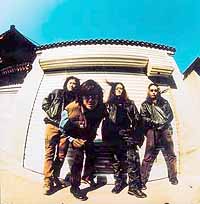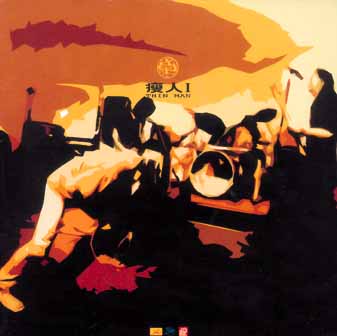|

Packed
stadium gigs, rave reviews in the local press and a sea-of-lighters-inspiring performance at the 1999 Annual New Music
Festival in Xinxiang, Henan province, have pushed Beijing-based garage
band Thin Man into the mainland
rock-and-roll limelight. Their eponymous debut album has already
sold more than 60,000 copies, and they are generating a stadium
rock-style groupie following. At a recent promotional record signing in
the downtown Beijing shopping district of
Wangfujing, the record store sold out of Thin Man cassettes, but that
didn't stop eager fans who proffered notebooks, shirts and even bare
skin for the band members to sign.
Most
of the fans were teenage girls. Just two years ago, rock fans in China
were almost exclusively male college students, but most of Thin Man's
most ardent supporters are female. "Everyone knows that Wang Lan is
the drum king," a teenage groupie gushes, "and he is a total
stud."
Thin
Man, in several incarnations, has been fueling fan enthusiasm since
1993. But their reputation as an electrifying live act really took off
in 1997 when erstwhile bass player Dai Qin became lead singer, fronting
for guitarist Fu Ning, bassist San'r and drummer Wang Lan. Drawing on a
wide array of Western and Chinese influences, their music is rich,
complex, and also catchy. Fans of Rage Against the Machine, Red Hot
Chili Peppers, Lenny Kravitz, Smashing Pumpkins, and Jane's Addiction
will hear these influences in Thin Man's music.
Dai
Qin has a magnetic stage presence and a voice full of tension and
resilience. His emotive vocals range from cracked whispers to explosive
howls, and incorporate aching melodies and ferocious raps. Growing up on
the grasslands of Inner Mongolia instilled an epic quality in his
personality that he brings to his performances. On stage and off, he is
flamboyantly expressive-almost melodramatic. He stomps across the stage,
pointing and posturing, shaking his long curly hair, and leaping into
the mosh pit with child-like glee.
Guitarist
Fu Ning's riffs range from calculated executions of technique to inspired
rages. Percussionist Wang Lan was judged China's best drummer in Beijing
Music Radio's All China Band Competition in both 1997 and 1999. His intricate
rhythms, syncopated tempo changes, and riot-inciting solos give Thin
Man's music an edgy feel. Bassist San'r uses slap improvisations,
rolling, dark harmonies, and driving, hard-edged bass lines, providing a
musical anchor for Thin Man's hard-core jams.
Thin
Man's song lyrics address problems common to youth everywhere: drug addiction
("June 26"), despair ("No Hope"),
self-destructiveness ("Wound"), betrayal
("Talk Talk") and even the war in Kosovo ("Enough
Already"). Their activist
message is sincere, but also politically expedient which has spared them
the word changes that many bands have to make to get albums approved for
distribution.
"We
want to show that rock music is not 'spiritual pollution'? Some of our
songs are angry, but emotional release is healthy. Our rage is directed
at things that hurt people? We want to show young people how to turn
that rage into a life-affirming force, to give them strength to face
their problems and be true to themselves," comments band leader Dai
Qin.
The
band members are true believers in the authenticity of rock music and
its distinctness from pop, which bassist San'r calls "a pop culture
assembly-line product." This distinction between rock and pop has
been very real in China until recently. Whereas in the west, rock music
has been packaged for the market since the 1960s, Chinese rock has not
been allowed to sell out-government restrictions on performance,
broadcasting and distribution of rock music ensured that money was not
driving the musicians.
"The
circle of underground rock musicians used to be a mutually-supportive community
based on the shared desire for unfettered self-expression through original
music," says Dai Qin. "Now the 'circle' is breaking up into
small cliques organized aroundstyle rather than substance. Now people
worry too much about what the market wants, and what's 'hip,' and not
enough about how to make the music that they themselves love." Thin
Man face the same problems, as Dai Qin explains: "If you want to be
heard, you need a market for your music."

The
band's debut album is an attempt to have it both ways. Thin Man believe
they have found a formula for gaining a large audience without losing
their artistic integrity by marketing images of authenticity and
politically correct activism. The combination of Cui Jian sound engineer
He Biao, and rising-star producer Zhang Yadong certainly gives their
album a running start. The sound is lighter and less bone-jarring than
when heard from the center of the mosh pit, but with the volume cranked
up it still packs a punch. The lineup of 11 songs clocks a full hour of
hard-driving rock, with high points in 'The Singer' (sung in Mongolian),
'Divorce', 'Protective Amulet', and 'Enough Already'.
For
Thin Man, rock is more than a musical genre. It is an ethos, their own
truth in a sea of what they see as other people's lies. Whether their
"truth" will be heard by many comes down to how the music is
marketed.
Whether
this "truth" can survive success comes down to the band
members
themselves.
Can Thin Man manage to square angry, hard and heavy music with
a
non-threatening, politically correct image? If their first album does
not answer the question, Thin Man II-scheduled for recording and release
next year-will make it clear what commodification has done to Thin Man's
cool.
Thin
Man (Jingwen Records)
Available
at music stores, department stores and at Thin Man performances,
cassette
RMB10; CD RMB 60.
|




